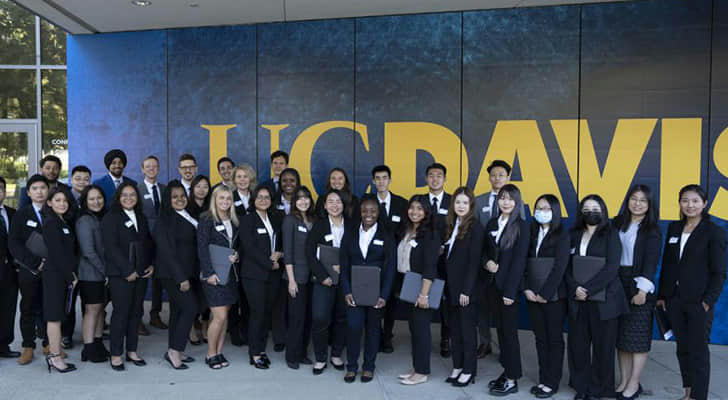Best Master Degrees in Accounting Programs Online: High Returns, Low Costs

Choosing a budget-friendly accounting master's program can make your educational investment more valuable. This guide will help you find top-rated, affordable online graduate programs in accounting.
Why Consider an Advanced Accounting Degree?
A master's degree in accounting can enhance your expertise and prepare you for important exams like the Uniform CPA Examination. These programs can significantly boost your career prospects.
Financial Benefits of a Master's in Accounting
Getting a graduate degree in accounting can offer strong financial returns. According to Payscale data from March 2024, the average salary for professionals with a master's in accounting is about $80,000 per year. Opting for a more affordable program can increase your return on investment (ROI).
Tuition Costs for Graduate Programs
Here's what the National Center for Education Statistics (NCES) reported as the average tuition for graduate students in the 2021-22 school year:
$29,931 at private nonprofit institutions
$14,161 at private for-profit institutions
$12,596 at public institutions
This guide will introduce you to online master's programs in accounting that are more affordable than these averages, helping you find a cost-effective path to your professional goals.
Top 5 Most Affordable Online Master's in Accounting Programs for 2024

1. University of California, Irvine (Irvine, CA)
Duration: 4 years
Accreditation: Association to Advance Collegiate Schools of Business
Total Program Tuition: $57,780
Credits to Graduate: 44
UCI offers both part-time and full-time enrollment options for their Master of Professional Accountancy program. Full-time students can complete the program in one year, while part-time students take two years. The curriculum includes courses on financial statement analysis, advanced audits, and emerging accounting topics, with specializations in areas like sustainability accounting and corporate governance. About 85% of students receive scholarships from UCI's Paul Merage School of Business.
2. University of Washington (Seattle, WA)
Duration: 4 years
Accreditation: Association to Advance Collegiate Schools of Business
Total Program Tuition:
In-State: $23,700
Out-of-State: $29,187
Credits to Graduate: 48
UW's Master of Professional Accounting program is a nine-month accelerated on-campus program. It includes courses on advanced accounting topics and a hands-on internship or independent research project. The program boasts a 100% job placement rate, with an average starting salary of $72,000.
3. University of North Carolina at Chapel Hill (Chapel Hill, NC)
Duration: 4 years
Accreditation: Association to Advance Collegiate Schools of Business
Cost per Credit (Online): $1,446
Credits to Graduate: 36-48
UNC-Chapel Hill offers both on-campus and online options for its Master of Accounting program. The on-campus program is ideal for students without an accounting background, while the online program caters to professionals from various fields and can be completed in 12-36 months. The curriculum includes core courses in financial reporting and managerial accounting, with concentrations in tax, audit, or financial analysis.
4. University of California, Davis (Davis, CA)

Duration: 4 years
Accreditation: Association to Advance Collegiate Schools of Business
Total Program Tuition: $52,800
Credits to Graduate: 48
UC Davis requires students to complete prerequisites before starting its nine-month Master of Professional Accountancy program. The curriculum includes courses on managerial accounting, audit data analytics, and accounting ethics. The university awards merit-based scholarships to nearly 80% of its graduate accounting students.
5. California State University, Fullerton (Fullerton, CA)
Duration: 4 years
Accreditation: Association to Advance Collegiate Schools of Business
Tuition Cost per Semester:
Part-Time: $2,082
Full-Time: $3,588
Credits to Graduate: 30
CSUF's MS in Accountancy program is available on campus and targets students with an accounting background. The core courses cover accounting theory, professional communications, and corporate taxation. Part-time learners benefit from reduced semester costs, though out-of-state students pay an additional $396 per credit.
Factors That Influence the Affordability of an Accounting Master's Program
While tuition is a major factor, you should also consider financial aid, school location, and course delivery formats. Here's a breakdown:
· Tuition
Graduate schools often calculate tuition on a per-credit basis, but some charge flat rates per semester or academic year. The per-credit model allows for more flexibility in budgeting, while flat-rate models can be advantageous if you can handle a full-time study schedule.
· Enrollment Status
Part-time enrollment offers the flexibility to work while studying, but it extends your graduation timeline and delays entry into the workforce. This could mean paying tuition longer and delaying higher salaries. Schools with per-credit tuition can offer better cost benefits for part-time students compared to flat-rate models.
· Location

Public schools may offer uniform rates for online programs, regardless of location, but some charge variable rates with in-state learners paying less. Hybrid programs, which combine online and in-person learning, can save on commuting costs but may still require some on-campus presence.
· Delivery Format
Online programs, especially those with asynchronous courses, offer significant scheduling flexibility. However, they might lack hands-on experiential learning opportunities, such as internships, which can be valuable.
· Financial Aid
Private institutions generally charge higher tuition than public ones but often offer generous financial aid, which can lower the net price of attendance. Non-repayable aid, like scholarships, fellowships, and grants, can significantly reduce your costs.
How to Pay for a Master's in Accounting Online
Start by seeking scholarships specific to your program or school. Many organizations, charities, and corporate programs offer scholarships to graduate accounting students.
Scholarships for Accounting Students

PCPS George Willie Ethnically Diverse Student Scholarship & Internship
Requirements: Offered by the AICPA, this scholarship is for ethnically diverse undergraduate and graduate accounting students who plan to pursue CPA licensure.
Award: Up to $10,000
AICPA John L. Carey Scholarship Award
Requirements: For non-business liberal arts degree-holders pursuing graduate accounting studies. Supports non-traditional students aiming for CPA licensure.
Award: $5,000
Deloitte Foundation Accounting Scholars Program
Requirements: Available to students in advanced accounting programs, covering concentrations in auditing, financial advising, or taxation.
Award: Varies (covers 100% of tuition fees for the academic year)
Strategies to Reduce Costs
· Consider an Accelerated Program
Accelerated programs with fast-paced schedules can lead to quicker graduation and less money spent.
· Overload Your Schedule
If your school charges flat rates, adding extra courses without extra fees can reduce your per-credit cost.
· Maximize Tax Advantages
The federal Lifetime Learning Credit (LLC) program offers up to $2,000 per year in tax savings for tuition payments at eligible institutions.
· Rent Textbooks
Renting textbooks instead of buying them can save hundreds or even thousands of dollars each year.
· Tuition Reimbursement
Check if your employer offers tuition reimbursement as part of your benefits package, especially if you're already working in a relevant field.
Is an Accounting Master's Degree Worth It?

Earning a master's in accounting online can offer long-term career rewards. Master's degree holders have higher CPA exam pass rates and earn more. For example, Payscale data from February 2024 shows CPAs with a master's earn an average of $97,000 per year, compared to $79,000 for those with just a bachelor's degree. Over a 20-year career, this difference can amount to over $360,000 in additional earnings.
Consider the potential ROI by comparing the salary increase against the debt accrued, the career-long earning potential, and the upfront costs of the program. An advanced degree can also open doors to higher-level management roles, making it a worthwhile investment for many professionals.
